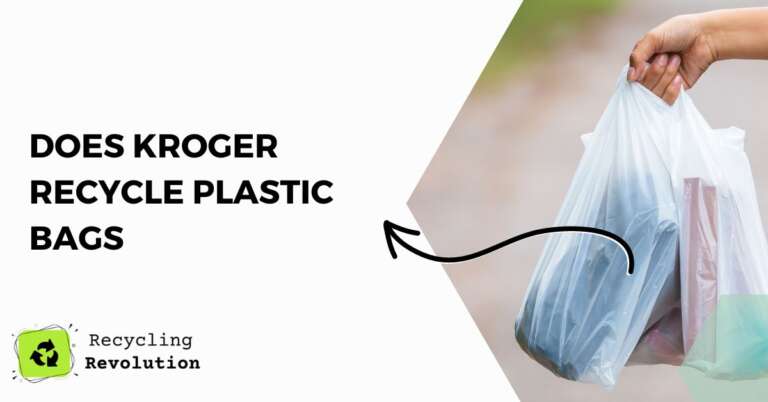There’s an increasing concern about the environmental impacts of single-use plastic bags, especially those dispensed by grocery stores and supermarkets. With this rising consciousness, the question often pops up: Does Kroger recycle plastic bags?
TL;DR: Yes, Kroger does recycle plastic bags. They have designated collection bins at each storeencourages customers to return their used bags to the store for recycling. Kroger then sends these bags off to recycling facilities to be transformed into new plastic products. However, it’s vital to ensure the bags are clean and dry before recycling them.
However, it’s more complicated than simply tossing them into your curbside recycling bin. Here, we’ll explore how the process works and offer advice on how to ensure your bags get recycled rather than end up in a landfill.
🧴 Plastic Recycling Estimator
🔍 Plastic Buyback Facts
Most buyback programs accept PET (water bottles), HDPE (detergent containers), and PP (caps, cups). Light plastics like bags and wrappers are harder to recycle, but containers and jugs are highly valued. Recycling plastic reduces landfill overflow and saves fossil fuels.
How Krogers Recyling Program Works
Kroger, like many other large grocery chains, has a plastic bag recycling program in place. They provide collection bins usually located at the front of the store. Once you’ve finished using your plastic bags, you can take them back to the store and deposit them in these bins.
It’s important to note that the bags should be clean and dry when you drop them off. Dirty or wet bags can contaminate an entire batch of recyclables, making it unrecyclable and destined for the landfill.
The collected plastic bags are then transported to recycling centers, where they are processed and converted into plastic lumber or small plastic pellets. These are subsequently used to create new products such as composite decking, outdoor furniture, and, in some cases, new plastic bags.
Kroger’s Environmental Commitment
Kroger’s plastic bag recycling is a part of their larger environmental sustainability strategy. The company is working to minimize waste in its stores and supply chains, reduce greenhouse gas emissions, and source responsibly.
They’ve set a goal to phase out single-use plastic bags in all their stores by 2025 and are encouraging customers to transition to reusable bags.
Proper Disposal Tips
- Clean and dry your bags: Rinely rinse and dry the bags before bringing them back to the store. Any contamination can lead to the bags being sent to a landfill instead.
- Bundle your bags: Rather than bringing bags back one at a time, collect a bundle of them at home before taking them back to the store. This minimizes the number of trips you need to make and the energy used for transportation.
From Bins to New Products
After customers deposit their used plastic bags in the designated collection bins, what happens next? The journey from the recycling bins to new products is an interesting one and sheds light on the importance of recycling plastic bags.
Collecting and Transporting the Plastic Bags
The collection bins at Kroger stores are specifically designed for plastic bag recycling. Once the bins are full, Kroger’s staff collects the bags and prepares them for transportation. The bags are often compacted into bales for easier handling and transport.
The bales of plastic bags are then transported to recycling facilities, typically in bulk to minimize greenhouse gas emissions from transportation.
Recycling Process: The Transformation
Upon reaching the recycling facilities, the bales of plastic bags are broken apart, and the bags are sorted. Any non-recyclable items, such as other types of plastic or trash that might have ended up in the bins, are removed at this stage.
The recyclable plastic bags are then cleaned and dried to remove any remaining contaminants. The clean plastic bags are heated and turned into plastic resin pellets. This is a critical step in the recycling process because these pellets form the base for new plastic products.
Creating New Products
The plastic resin pellets are then sold to manufacturers who use them to create new plastic products. This can range from new plastic bags to more durable items like plastic lumber, park benches, playground equipment, and even backyard decks.
It’s important to note that not all plastic bags end up being recycled into new plastic bags. Many are used in creating more robust and durable goods, helping to extend the life of the plastic and keep it out of the environment for a longer period.
Kroger’s Efforts to Phase Out Plastic Bags
While Kroger is actively recycling plastic bags, the company is also aware that the ideal solution is to reduce plastic usage altogether. They’ve announced a plan to eliminate single-use plastic bags in all stores by 2025.
This initiative, called “Zero Hunger | Zero Waste,” aims to end waste in the company by 2025.
Importance of Customer Participation
The success of Kroger’s recycling program heavily depends on the active participation of its customers. Customers are urged to return their plastic bags to Kroger stores, but it’s important to remember a few guidelines.
The bags must be clean and dry to be recyclable. Bags that are dirty or wet can contaminate the recycling process, rendering it ineffective.
Furthermore, while Kroger’s recycling bins accept all types of grocery plastic bags, it’s advisable not to include other forms of plastic, such as cling wrap or packaging material. These can disrupt the recycling process.
How to Can Curb The Plastic Problem
As consumers, we play a crucial role in managing the plastic problem. By choosing to recycle our plastic bags, we can ensure they are transformed into useful products instead of ending up in landfills or the ocean.
But recycling is just one part of the solution. It’s equally important to reduce our consumption of single-use plastics. Opting for alternatives like reusable bags or cardboard boxes can significantly reduce the amount of plastic waste we generate.
Alternatives to Plastic Bags
While recycling is a valuable step in managing waste, it’s not a perfect solution. It’s more effective to reduce plastic use in the first place. Here are some alternatives to plastic bags:
- Reusable Grocery Bags: I recommend investing in reusable grocery bags. They are sturdy, can carry more items than plastic bags, and can be used hundreds of times before needing replacement.
- Mesh Produce Bags: Instead of using plastic bags for fruits and vegetables, consider buying mesh produce bags. They are washable and reusable, making them an eco-friendly option.
- Cardboard Boxes: Some stores, including many Kroger locations, offer cardboard boxes to carry your groceries. These boxes can be reused, recycled, or composted, offering a more sustainable option.
Conclusion
In conclusion, Kroger does recycle plastic bags, but the responsibility also lies with us, the consumers, to ensure we’re doing our part. By returning clean, dry plastic bags to the store, we can contribute to a circular economy.
More than this, by transitioning to alternatives like reusable bags and cardboard boxes, we can reduce our reliance on single-use plastics altogether.
FAQ
Does Kroger recycle other types of plastic?
Yes, in addition to plastic bags, many Kroger stores also have recycling programs for rigid plastics, like water bottles and milk jugs.
What happens if I put my plastic bags in the curbside recycling bin?
Most curbside recycling programs do not accept plastic bags. They can get tangled in the machinery at the recycling facility, causing significant problems. Always recycle your plastic bags at a store with a designated collection program, like Kroger.
Can I recycle plastic bags from other stores at Kroger?
Yes, you can recycle plastic bags from other stores at Kroger. Their recycling bins accept all types of clean and dry grocery bags.
Note: Policies may vary by location, so it’s a good idea to check with your local store staff if you’re uncertain.

